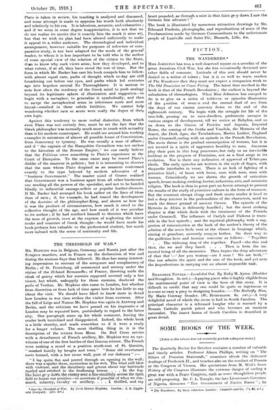GREEK POLITICAL THEORY.•
Ms. BARKER'S work is addressed avowedly to students. It is written especially for the man who is preparing against the time when he will be called upon to " give a brief outline of the theories of the School of Pythagoras," or to " distinguish between the ethical opinions of Socrates and the later Cynics." Every Greek thinker of whom we have any distinct report up to, and including, • ,Gresk Political Theory : Plato and hie Predeceelors. By Ernest Barker, London: Methuen and Co. (14s. net.i Plato is taken in review, his teaching is analysed and discussed, and some attempt is made to appraise his worth both absolutely and relatively to his era. It is laborious, accurate, and exhaustive ; and if we seem in some degree inappreciative, it is not that we do not realize its merits (for it exactly hits the mark it aims at), but that we wish its plan had been altered sufficiently to make it appeal to a wider audience. The chronological and individual arrangement, however suitable for purposes of reference or com- parative study, is not best adapted for the needs of the general reader, to whom it is less important to be told who is the author of some special view of the relation of the citizen to the State, than to know why such views arose, how they developed, and to what extent, if at all, they have stood the test of time. But the form in which Mr. Barker has cast his book compels him to follow, with almost equal care, paths of thought which to-day are still broadening out before our eyes, and paths which led centuries ago into hopeless mental No Thoroughfares. It is curious to note how often the tendency of the Greek mind to push analogy beyond its legitimate sphere of illustration and suggestion—to begin with a metaphor, to generalize it symbolically, and then to merge the metaphorical sense in inferences more and more literal—resulted in these subtle futilities. We cannot help wondering whether men so acute were really the dupes of their own logic.
Against this tendency to mere verbal dialectics, from which even Plato was not entirely free, must be set the fact that the Greek philosopher was normally much more in touch with actuality than is his modern counterpart. He could see around him working examples in miniature of almost all possible forms of Constitution, from democracy to tyranny. He was usually a man of affairs ; and if " the captain of the Hampshire Grenadiers was not useless to the historian of the Roman Empire," we can easily believe that the Politicos owes something to Plato's experience at the Court of Dionysius. To the same cause may be traced Plato's dislike of the amateur in politics ; but it is interesting to observe that the man whom Plato despised as an amateur conformed exactly to the type beloved by modern advocates of a " business Government." The master mind of Greece realized that Government was a business apart from all other businesses, one needing all the powers of the specialist, and not to be handed blindly to influential sausage-sellers or popular leather-dressers. If Mr. Barker had arranged his book rather on the lines of ideas than of men ; if, for example, he had traced the development of the doctrine of the philosopher-King, and shown us how far it was the product of circumstances, how much it owed to the collective thought of the age, and how much of it was peculiar to its author ; if he had confined himself to theories which have the note of growth, even at the expense of neglecting the minor nooks and crannies of Greek thought—he would have made his book perhaps less valuable to the professional student, but much more imbued with the sense of continuity and life.



































 Previous page
Previous page